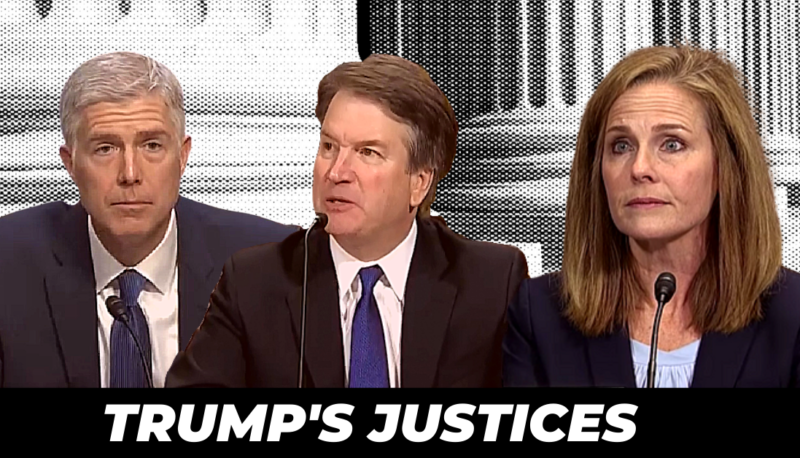“Confirmed Judges, Confirmed Fears” is a blog series documenting the harmful impact of President Trump’s judges on Americans’ rights and liberties. Cases in the series can be found by issue and by judge at this link
One or more of Trump justices Brett Kavanaugh, Neil Gorsuch and Amy Coney Barrett cast deciding votes in an unsigned “shadow docket” ruling that blocked part of New York state’s COVID-19 related eviction moratorium. The August 2021 decision was in Pantelis Chrysafis v Marks.
As part of its response to the COVID-19 pandemic, the New York legislature passed a law limiting the ability of landlords to evict tenants for nonpayment of rent and thus cut down the risk of the spread of COVID-19. Under the legislation, tenants can invoke financial hardship as a defense to evictions by submitting a “sworn attestation” stating that they are “experiencing financial hardship or health impacts as a result of the pandemic.” Eviction proceedings are then stayed until the legislation expires on August 31 of this year. Landlords challenged the law but a district court ruled against them, and when the Second Circuit declined to grant them an injunction against the law while they appealed, they asked the Supreme Court to do so in July.
In an unsigned three-paragraph order on August 12, the Court granted the landlords’ request. The order was another example of the Court’s recent use of its “shadow docket,” since it was issued without full briefing and oral argument, without a full opinion, and without even identifying which justices voted for the order. Since Justices Stephen Breyer, Sonia Sotomayor, and Elena Kagan dissented, at least one of the three Trump justices must have voted for the order, and all three may well have done so. The only explanation in the order was that the law violates due process by allowing a tenant to “be a judge in his own case” when submitting a sworn attestation of hardship, which landlords cannot contest until the law expires on August 31.
Justice Breyer strongly dissented, joined by Justices Sotomayor and Kagan. Under prior Court precedent, he pointed out, the “drastic relief” requested by the landlords should be granted only if their rights were “indisputably clear” and there was a “critical and exigent” need for the relief. But the legal merits are not “indisputably clear,” Breyer explained, because the law does not deprive landlords of the right to contest the financial hardship claims in eviction proceedings. Instead, it only results in a “delay” in such proceedings now for “less than three weeks until the law expires.” The landlords had failed to show any “critical and exigent” need during that time, Breyer went on, particularly when balanced against the hardship on tenants who will be “forced to face eviction proceedings earlier than expected.” Many such evictions may be “unnecessary,” Breyer noted, if federal aid reaches such tenants. In addition, even while the law is in effect, it still allows landlords to sue for unpaid rent in proceedings that do not involve eviction, and it protects landlords who own ten or fewer dwellings from foreclosure. Overall, Breyer concluded, the Court should not “second-guess politically accountable officials’ determination” on “how best to ‘guard and protect’ the people of New York” from the pandemic.
The consequences of the Court’s order remain unclear. Officials have stated that it is a “serious setback” that could “expose thousands to eviction,” with more than 830,000 New York households now behind on rent. The CDC eviction moratorium should help, but challenges to that are pending as well and this ruling raises additional serious concerns about what the Trump justices and the full Court will do on that issue. Although there are no Supreme Court vacancies at present, it remains crucial to our fight for our courts that the Senate promptly confirm Biden nominees to all our courts who will respect the rule of law and the rights of all Americans.

